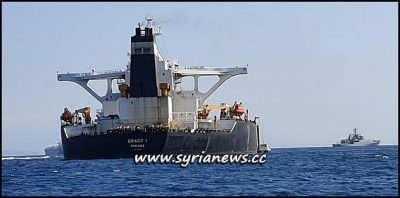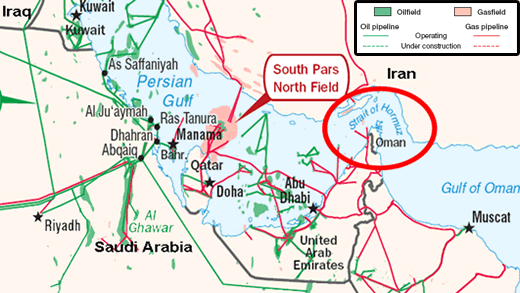America Pours “Oil into Fire” in Persian Gulf. Strategic Waterways. Control of Strait of Hormuz
Delhi is maintaining deafening silence

The illegal seizure of an Iranian oil tanker off Gibralter by the British Navy last Friday is fast acquiring farcical character. Britain acted at the behest of the US; in turn, the US probably acted at the behest of the ‘B Team’. So far, only one top US official has expressed joy over the incident — National Security Advisor John Bolton, who is of course the member-secretary of the B Team. None of the other three members of the B Team — Israeli PM Benjamin Netanyahu or either of the two Gulf Crown Princes (bin Salman and bin Zayed)) has waded into the controversy.
The original intention behind the Anglo-American operation was clearly to provoke the Iranians into some retaliatory action. But Iran refused to be provoked and is biding its time. Had Iran acted impulsively or rashly, a military conflagration might have ensued, which would have provided just the alibi for a large-scale US military strike at Iranian targets. Even Article 5 of the NATO Charter on collective security might be invoked. The B Team has been angling for just such a window of opportunity. The US defence secretary’s last visit to Brussels was a mission to rally NATO support for a military strike against Iran.
Now, Iran is savvy enough to figure out the Anglo-American game plan. Tehran is indignant and has warned of consequences, but all in good time. Since Iran refused to be provoked, Britain made a false allegationthat Tehran made an abortive attempt to “intimidate” a British oil tanker. Tehran, of course, furiously denied the allegation. Meanwhile, there is a parallel move by the US to assemble a ‘coalition of the willing’ ostensibly to protect oil tankers in the Strait of Hormuz, an Iranian waterway. Therein hangs a tale.
The false allegation by Britain has been promptly seized by the US Navy to press ahead with its master plan to establish military escorts for shipping in the Strait of Hormuz. General Mark Milley, who has been nominated to become chairman of the US Joint Chiefs of Staff, has bene quoted as saying on July 11 during a testimony before the Senate Armed Services Committee in Washington that the Pentagon is working to put together a coalition “in terms of providing military escort, naval escort to commercial shipping.” In his words, “I think that that will be developing over the next couple weeks.” Milley characterised the project as an assertion of a fundamental principle of “freedom of navigation”, a coinage Washington uses arbitrarily in its “Indo-Pacific” rule book.

The Strait of Hormuz, located betweenIran and Oman connects the Persian Gulf with the Gulf of Oman and the Arabian Sea and is the world’s most important oil chokepoint.
It doesn’t need much ingenuity to figure out that the US intends to take control of the Strait of Hormuz — although the strait is Iranian-Omani waters under international law. As the narrowest point of the Strait of Hormuz is twenty-one nautical miles, all vessels passing through the Strait must traverse the territorial waters of Iran and Oman. The rights of passage for foreign vessels under international law will consequently be subject to either the rules of non-suspendable innocent passage or transit passage depending on the applicable legal regime.
The topic has come before the International Court of Justice. The ICJ confirmed the customary international law rule, used in international navigation, that foreign warships have the right of innocent passage in straits during peacetime, which means that during peacetime the coastal state could only prohibit the passage of any foreign-flagged vessel if its passage was non-innocent.
However, the grey area here (which the US wants to challenge) is that Iran has the legal right as a coastal state to prevent transit or non-suspendable innocent passage of ships if the ship that is in engaged in passage through the strait constitutes a threat or actual use of force against Iran’s sovereignty, territorial integrity, or political independence, or could be acting in any other manner in violation of the principles of international law embodied in the Charter of the United Nations.
In strategic terms, therefore, by precipitating the seizure of the Iranian oil tanker, the US and Britain are proceeding on a track to create a pretext to challenge Iran’s rights over the Strait of Hormuz and to take control of the strait. This is also contingency planning in advance insofar as under international law, if the US were to attack Iranian territory without a decision of the UN Security Council, the question would arise whether the provisions for transit passage under UNCLOS would continue to apply to the Strait of Hormuz or whether Iran could invoke the laws of war and take action against tankers, especially if they are deemed to be assisting the enemy.
Suffice to say, it is possible to see that what might have appeared as a maverick or silly act by Britain off Gibralter when it seized the Iranian tanker could actually be the tip of a calibrated project aimed at imposing effectively a naval blockade against Iran. Indeed, this forms the latest chapter in the US’‘maximum pressure’ policy against Iran.
By the way, a second leg of the current project is also to seize control of the strategic shipping lanes via the the Bab al-Mandab (off Yemen), which leads to the Suez Canal. (The narrow Bab al-Mandab connects the Red Sea with the Gulf of Aden and the Arabian Sea.)

The chokepoint of Bab el-Mandab off Yemen connecting Indian Ocean to the Suez Canal via Red Sea
The US control of the Bab al-Mandab will mean that Iran’s use of the Suez Canal will come under intense US monitoring. The US has a military base in Djibouti facing the Bab al-Mandab. (Against this backdrop, the bitterly-fought war in Yemen falls into perspective, too.)
Of course, all this constitutes acts that are in gross violation of international law and the UN Charter and India should keep miles away from the Anglo-American project to impose naval blockade against Iran on whatever pretext.
Indeed, India will be called upon to take some tough decisions in the period ahead vis-a-vis the emergent situation in the Persian Gulf. First and foremost, India should stay clear of the US-led project to establish military escorts for ships in the Persian Gulf. There are reports that the Indian Navy has deployed two ships with helicopters in the Gulf of Oman. Presumably, this deployment will not form part of the US-led naval flotilla to intimidate and blockade Iran.
Second, there is a strong likelihood of the US invoking its privileges under the Logistics Exchange Memorandum of Agreement to gain access to Indian military facilities for the purpose of refuelling and replenishment of its ships. At the signing of the LEMOA in 2016, much criticism was expressed by Indian experts that it was a “strategic mistake”. In an impassioned plea, Bharat Karnad wrote in August 2016: “It (LEMOA) is, perhaps, the most serious strategic mistake made by the country in its nearly seven decades of independent existence.” Karnad’s criticism forewarning the serious consequences has turned out to be prescient. (here)
The LEMOA’s text remains secret. The Indian public doesn’t even know if India has an option to reject any US demarche for access to our military bases for their ships in a situation such as today’s when war clouds are gathering in our extended neighbourhood and Washington is stepping up preparations for a military operation against Iran, a friendly country with which India has had profound civilisational ties and common concerns in the contemporary regional setting.
The government will be betraying India’s medium and long-term national interests if it provides the US Navy with back-up facilities in its military bases at present under the LEMOA.
Third, most important, Delhi is maintaining deafening silence — for reasons best known to the policymakers — over the gathering storms in the Persian Gulf region. Damn it, over 7 million Indians live and work in that region. Even if one were to overlook that these Gulf-based NRIs give significant budgetary support to the Indian economy, running into billions of dollars annually through their remittances, the government owes it to its citizens to leave no stone unturned to ensure their physical safety and security. Tens of millions of their relatives in India depend on them critically for livelihood.
Shouldn’t the government say something to the effect that India opposes a war situation in the Persian Gulf and that the Trump administration should act with utmost restraint? If this is not a foreign policy issue of consequence for the Prime Minister to articulate, what else could be? Other countries such as Russia, China and the US’ close allies have spoken on the Persian Gulf crisis.
What explains the government’s cowardice? Fear of Trump? Are our elites far too compromised with the B Team? Faustian deal with Netanyahu (who is reportedly heading for Delhi to meet PM)? Or, plain Ostrich Approach of seeing no evil, hearing no evil or speaking no evil if it is about Uncle Sam? At any rate, what kind of impression of a regional power of India is it that the government is projecting? Shame on India!
*
Note to readers: please click the share buttons above or below. Forward this article to your email lists. Crosspost on your blog site, internet forums. etc.

